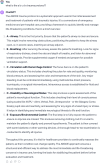ChatGPT-4 Knows Its A B C D E but Cannot Cite Its Source
- PMID: 39238880
- PMCID: PMC11368215
- DOI: 10.2106/JBJS.OA.24.00099
ChatGPT-4 Knows Its A B C D E but Cannot Cite Its Source
Abstract
Introduction: The artificial intelligence language model Chat Generative Pretrained Transformer (ChatGPT) has shown potential as a reliable and accessible educational resource in orthopaedic surgery. Yet, the accuracy of the references behind the provided information remains elusive, which poses a concern for maintaining the integrity of medical content. This study aims to examine the accuracy of the references provided by ChatGPT-4 concerning the Airway, Breathing, Circulation, Disability, Exposure (ABCDE) approach in trauma surgery.
Methods: Two independent reviewers critically assessed 30 ChatGPT-4-generated references supporting the well-established ABCDE approach to trauma protocol, grading them as 0 (nonexistent), 1 (inaccurate), or 2 (accurate). All discrepancies between the ChatGPT-4 and PubMed references were carefully reviewed and bolded. Cohen's Kappa coefficient was used to examine the agreement of the accuracy scores of the ChatGPT-4-generated references between reviewers. Descriptive statistics were used to summarize the mean reference accuracy scores. To compare the variance of the means across the 5 categories, one-way analysis of variance was used.
Results: ChatGPT-4 had an average reference accuracy score of 66.7%. Of the 30 references, only 43.3% were accurate and deemed "true" while 56.7% were categorized as "false" (43.3% inaccurate and 13.3% nonexistent). The accuracy was consistent across the 5 trauma protocol categories, with no significant statistical difference (p = 0.437).
Discussion: With 57% of references being inaccurate or nonexistent, ChatGPT-4 has fallen short in providing reliable and reproducible references-a concerning finding for the safety of using ChatGPT-4 for professional medical decision making without thorough verification. Only if used cautiously, with cross-referencing, can this language model act as an adjunct learning tool that can enhance comprehensiveness as well as knowledge rehearsal and manipulation.
Copyright © 2024 The Authors. Published by The Journal of Bone and Joint Surgery, Incorporated. All rights reserved.
Conflict of interest statement
Disclosure: The Disclosure of Potential Conflicts of Interest forms are provided with the online version of the article (http://links.lww.com/JBJSOA/A667).
Figures



References
-
- Lee P, Bubeck S, Petro J. Benefits, limits, and risks of GPT-4 as an AI chatbot for medicine. New Engl J Med. 2023;388(13):1233-9. - PubMed
Publication types
LinkOut - more resources
Full Text Sources
